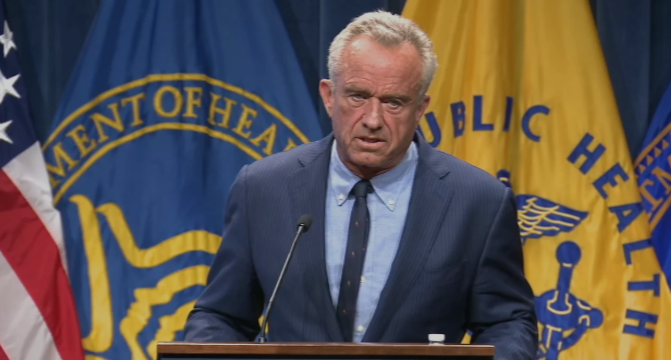The National Institutes of Health (NIH) has begun collecting vast amounts of private medical data from millions of Americans — pulling from multiple federal, commercial, and healthcare databases — to supply researchers working on Health Secretary Robert F. Kennedy Jr.’s newly launched autism study. The ambitious and controversial initiative is being fast-tracked to meet Kennedy’s public pledge to identify the cause of autism by September 2025.
According to a CBS News investigation, the NIH is not only aggregating sensitive personal health records but is also reportedly creating a new national autism registry intended to track individuals diagnosed with autism spectrum disorders. The move is raising fresh privacy concerns, with experts warning that such unprecedented data collection efforts pose significant risks to patient confidentiality and may set a dangerous precedent.
A High-Stakes Promise Critics Call Unrealistic
The NIH claims it’s acting in response to Kennedy’s campaign-trail promise and subsequent order as health secretary to “root out the environmental causes” of what he has controversially referred to as an autism epidemic. The secretary has repeatedly suggested, without scientific consensus, that autism is driven by environmental toxins and other external factors, despite decades of peer-reviewed research finding no evidence to support such claims.
“If you ask me, as a scientist, whether it’s possible to pinpoint the cause of autism within that timeline — by September — I don’t see any way,” said Dr. Peter Marks, director of the FDA’s Center for Biologics Evaluation and Research, in an appearance on CBS’s Face the Nation earlier this month. Marks is among a growing chorus of experts expressing skepticism about both the study’s feasibility and its ethical implications.
NIH Defends Data Collection Push for Autism Research
Speaking at an NIH advisory meeting on Monday, NIH Director Dr. Jay Bhattacharya defended the sweeping data-gathering operation, claiming it would help researchers conduct comprehensive autism research by consolidating scattered, fragmented patient data that has traditionally been difficult to access.
“The idea behind the platform is that existing data resources are siloed, disorganized, and costly to access,” Bhattacharya said. “Even data owned by federal agencies can be hard to obtain, and the NIH often ends up paying for the same data sets multiple times.”
Bhattacharya confirmed that the NIH is actively exploring expanded access to data from the Centers for Medicare and Medicaid Services (CMS) and other government health systems. The autism study also plans to integrate data from pharmacy medication records, genetic testing results, clinical records from the Department of Veterans Affairs (VA) and the Indian Health Service (IHS), insurance claims from private health insurers, and even personal data collected from smartwatches and fitness trackers.
According to CBS News, the project is expected to award grants to between 10 and 20 outside research teams, giving them direct access to this extensive data pool.
A National Health Surveillance Platform in the Making?
While the NIH frames this data initiative as a tool for autism research, officials have openly acknowledged its potential use for broader health surveillance. Bhattacharya suggested that the new platform could eventually provide health agencies with “real-time health monitoring” capabilities, offering unprecedented insight into Americans’ medical records, chronic illnesses, and lifestyle data.
“What we’re proposing is a transformative real-world data initiative aimed at providing a robust, secure, and comprehensive data platform for chronic disease and autism research,” Bhattacharya said during the presentation. “It could significantly reshape how public health challenges are studied in the U.S.”
Despite echoing Kennedy’s ambitious promise that new answers about autism’s causes would emerge by September, Bhattacharya admitted the initiative would ultimately be an “evolving process” that would extend well beyond the initial deadline.
Privacy and Ethical Concerns Intensify
The scope and speed of the NIH’s data collection efforts have alarmed privacy advocates and public health experts alike. Critics argue that merging government, commercial, and personal health data into a single database — particularly one involving identifiable medical records — raises serious privacy risks and ethical red flags.
“The public deserves transparency about how their sensitive health data is being used, who has access to it, and what safeguards are in place,” said Dr. Lisa Carlson, a public health policy expert and former president of the American Public Health Association. “This is a level of surveillance that’s never been attempted before under the guise of autism research, and it could fundamentally alter Americans’ relationship with their health data.”
A Controversial Narrative Despite Scientific Consensus
Kennedy, who has long courted controversy with his anti-vaccine rhetoric and scientifically disputed claims about autism, made headlines earlier this year when he declared that the sharp increase in autism diagnoses in recent decades was proof of an ongoing “autism epidemic caused by environmental toxins.” This assertion runs counter to extensive studies conducted by organizations such as the Centers for Disease Control and Prevention (CDC), World Health Organization (WHO), and numerous universities, which have found no causal link between environmental toxins and the rise in autism diagnoses.
Health experts also point out that much of the increase in autism rates over the past two decades is attributed to better diagnostic criteria, heightened awareness, and expanded diagnostic services — not environmental factors.
Looking Ahead
As the NIH moves swiftly to assemble its vast database and issue grants to research teams, public health experts and privacy advocates will be watching closely. The results of this study, and the precedent it sets for how federal health agencies handle Americans’ private medical information, could have lasting implications for public trust, medical privacy, and evidence-based health policy in the years to come.



